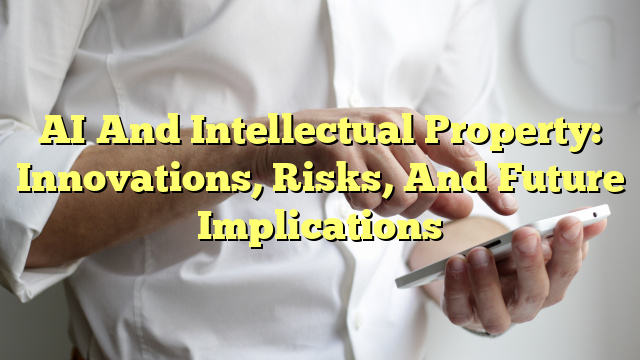Table of Contents
- AI and IP Implications
- Future Implications of AI
- Risks of Artificial Intelligence
- Negative Effects of Artificial Intelligence
AI and IP Implications
The introduction of artificial intelligence (AI) in the workplace has raised important legal and ethical questions about the implications for intellectual property (IP) protection. As AI-enabled systems become widely used and accepted, the potential for IP infringement is an increasingly pressing concern. AI-based technology can be used to create works of art, literature, music, and software, and these works can be subject to IP protection. In the US, copyright protection is available for original works of authorship, including AI-generated works. Additionally, AI-enabled systems may infringe on another party’s IP rights by reproducing, distributing, or displaying copyrighted material without permission.
The implications of using AI with regards to IP protection vary depending on the type of technology and the purpose of its use. For example, using AI to generate new works of literature may require copyright registration to protect the works. At the same time, using AI to analyze data in order to generate insights that are useful in the development of new products or services may require trade secret protection. AI can also be used to automate processes that are subject to patent protection.
Future Implications of AI
The implications of artificial intelligence for the future of humans are varied and wide-reaching. On one hand, AI-enabled technology can bring great benefits to society, such as improved healthcare, better education, and greater efficiency in the workplace. On the other hand, AI has been criticized for its potential to create a gap between those who can access and benefit from the technology and those who cannot. Additionally, AI-driven automation has the potential to displace human labor, leading to job losses and other economic disruptions.
One of the major implications of AI for the future is the need for increased regulation to protect consumers and ensure ethical use of the technology. This is especially true as AI-enabled systems become more powerful and autonomous. Governments and industry organizations will need to work together to develop regulations that protect IP rights, promote fair competition, and enhance consumer privacy and safety.
Risks of Artificial Intelligence
The risks of artificial intelligence include potential security threats, ethical concerns, and economic impacts. AI-enabled systems and technologies can be used to perpetrate cybercrimes, such as identity theft or malicious attacks on computer networks. Additionally, AI can be used to gain access to confidential information, such as financial records or personal data.
There are also ethical risks associated with AI, such as the potential for biased decision-making. AI-enabled systems can be programmed to make decisions based on biased data, leading to unfair outcomes. Additionally, AI-driven automation can lead to job displacement, which can have a negative impact on the economy and on individuals.
Negative Effects of Artificial Intelligence
The negative effects of artificial intelligence include economic disruption, privacy risks, and job displacement. AI-enabled automation can lead to the elimination of jobs, resulting in economic disruption and insecurity for those affected. Additionally, AI-based systems can be used to collect and process large amounts of personal data, which can lead to privacy risks and potential misuse of the data. Finally, AI-driven decision-making can lead to biased outcomes that can be detrimental to society, such as discrimination or unfair advantages for certain groups.
In conclusion, AI is increasingly being used in the workplace, and this trend is likely to continue as the technology becomes more powerful and autonomous. The implications of AI for IP protection and the future of humans are varied and wide-ranging. While AI can bring great benefits, it also carries risks associated with security threats, ethical concerns, and economic disruption. It is important for governments and industry organizations to work together to develop regulations that protect IP rights, promote fair competition, and enhance consumer privacy and safety.


Great article exploring the potential effects of AI on Intellectual Property. It raises key questions of ownership and risk management. To take this further, other effects of AI on international business and patent regulation should be considered.
AI implicates exciting opportunities for IP protection and potential risks.
AI-driven IP risks overvaluing novelty, lacking creative expression.